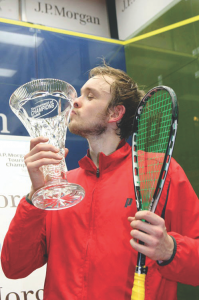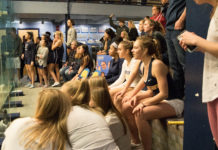By Damon Leedale-Brown, Sports Scientist & Conditioning Specialist
In a break from the series of strength training articles it seemed appropriate to write this article having just returned from New York City where I had the pleasure of watching James Willstrop win the coveted Tournament of Champions title in Grand Central Terminal. On his way to the title James earned victories against the current World No. 1, the former World No. 1 and the current World Champion!
I have known James for many years now having initially started working with him as a 15-year-old junior player during his preparation for the World Junior Championships in 2000, and subsequently the 2002 World Junior Championships—where he won the individual title. It has been exciting to be involved in his progression from a talented junior player to one of the World’s top players on the men’s tour, and also to understand the level of training that goes into becoming the very best in your sport.

Training specialists often talk about the 10 year or 10,000 hour rule—evidence from elite athletes in many sports suggests that this is the training period required for an athlete to truly reach their peak. Obviously there will be exceptions to this rule (especially in technical sports) where players with fantastic talent make a break through at an earlier age, such as Ramy Ashour the current World No. 1 at age 23. Certain sports such as female gymnastics are considered “early specialization” where performers will often be peaking around 15-16 years old, but if you look at the training history of these young athletes you will often find that they have been in a full-time training program since the age of 6-8 years old!
In squash, consider the recent Men’s World No. 1 ranked players: Gregory Gaultier turned pro at age 17 and became World No. 1 at age 26; Karim Darwish pro at 18—World No. 1 at 27; Amr Shabana pro at 16—World No. 1 at 26. James Willstrop pro at 17—winner of TOC at 26. So this suggests that male squash players typically reach their peak playing phase around age 26 onwards (or after 10 years of training).
So aside from the 10 years of commitment, discipline and drive to train full-time what other elements play a factor in producing a World Class Squash player:
• Passion James was born into a family that was passionate about squash. His Dad (Malcolm Willstrop) coaches (and is actually James’s coach), so James was exposed to the sport from a young age which is when his love for squash first started.
 • Belief From an early age James has always been resolute in believing he could become the World’s best player. There will be plenty who cast doubt along the way—as a junior player he was often told he would never become a world class pro because he was too tall! My approach with James has always been that with appropriate training on his movement and strength, his size would primarily be an advantage on the court.
• Belief From an early age James has always been resolute in believing he could become the World’s best player. There will be plenty who cast doubt along the way—as a junior player he was often told he would never become a world class pro because he was too tall! My approach with James has always been that with appropriate training on his movement and strength, his size would primarily be an advantage on the court.
• Attention to Detail James is very detail-orientated in every aspect of his training and preparation including his diet, ensuring optimal recovery and regeneration between hard training days, rigorously performing pre-habilitation exercises that help maintain body health during competition phases. 100% focus goes into every one of his training sessions whether an on-court practice session or a gym session to develop strength and power in his movement, while also stressing the importance of the warm up and cool down phases around all sessions.
• A Team You Trust Behind most elite athletes you will find a strong support team that the athlete 100% trusts and believes in, and relationships which have developed over many years. James’s father, Malcolm, has been his coach from a very young age. Malcolm travels with James to major events and is a calming influence during and between matches. His half-brother, David Campion, is an England Coach and assists James with developing technical resilience on court during periods of high physical and mental pressure. James has the support of England Squash, and the resources provided by the English Institute of Sport including sports massage, physical therapy and medical support. I have been fortunate to be part of this team, working with James for over 10 years, and find our time is now spent between creating new ideas and progressions in his training, along with many discussions about the mental aspects of world class competition and the constant drive to become World No. 1.
These are only some of the elements behind a world class player that play a key role in their success. So if you have aspirations to be a world class squash player, or highly successful in other arenas such as business, academics or music, then start building a team of people around you that you trust, be passionate and 100% committed in your development, and start putting the work in—only 10 years to go!





